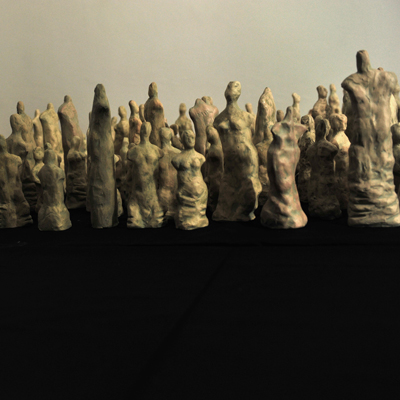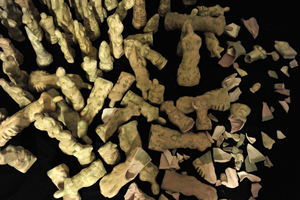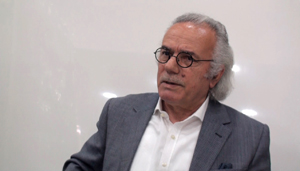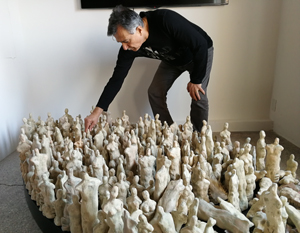AZAD KARIM
FRAGMENTS OF REALITY
Multimedia exhibition
The creative opus of Azad Karim, a Kurd originating from Iraq, reflects an interesting evolution of a sensitive artist. What has been stimulating and defining his artistic expression for over 35 years, are ancient cultures between the Euphrates and the Tigris which are considered to be the cradle of human civilisation, as well as the current political activity in this part of the world, in Europe, and in Slovenia, where the artist has been living for over 40 years. His expression is distinct and well recognisable within both national and European territory by his colourful and symbolic poetics, and by intertwining experiences of European modernism and Eastern mysticism.
In the past two decades Azad Karim has been frequently travelling to his homeland, and at the same time studying in various European and other cities. He has also been focusing more intensely on researching Sumerian, Acadian, Babylonian, Assyrian, and other Mesopotamian civilisations. Despite settling down in his new home in Slovenia, the genius loci of his native Kurdistan remains the key element of his mental, emotional and creative preoccupation.
As far as content is concerned, the multimedia project Fragments of Reality presents a follow up of his past cycles entitled Lost Heritage (2012 in Rijksmuseum van Oudheden of Leiden in the Netherlands) and Lost Artefacts (2013 in Obalne Galerije Piran). At the same time, it is the most authentic reflection of his on-going preoccupation with global political and social changes in Kurdistan, Iraq and more widely in the East. With the project the artist also expresses his concern about disastrous consequences, not only for the people and nations, but also for the several thousand years of preserved heritage, which is spared neither by new-age economic, political and religious interests, nor by various ideologies and political systems. Unfortunately, at the turn of the third millennium, humanity is witnessing genocides and culturecides in many parts of the world, and Azad Karim, being a responsive artist, feels mentally and emotionally challenged and disappointed again and again by outrageous acts of vandalism such as stealing, looting and destroying museums, archaeological sites and places, which have been going on for a long lime also in Iraq. Of course, he is also upset by the unresponsive international public, professionals, and responsible institutions. In his selected art forms and in his original reinterpretation, the artist creates a new, independent story, which is extremely subjective and at the same time universally relevant; this story becomes the artist’s reminder and warning, his communication with the public which he wants to inform so that they would become aware and start thinking about the incomprehensible, but well-planned, destruction and loss of heritage anywhere in the world. Azad Karim created more than 300 fragile ceramic figures which he installed around the exhibition hall in the way that they remind the viewer of ships as a symbolic reflection of the on-going refugee issues in the Mediterranean Sea. He had previously destroyed some of the figures by breaking them himself into shards, which is documented in the video. These acts of destruction and the very shards are Karim’s metaphorical and symbolic offering to ancient civilisations, especially the Mesopotamian one, and his problematisation of art as the most distinctive element of identity and entity of each and every nation, and of each and every individual person. In the video, his reflections and experiences are further underlined by interview with the Kurdish painter Karani Jamil of Arbil.
The exhibition Fragments of Reality is especially distinguished by Karim’s ethical stands, his sincere and deeply intimate perception and sentience of the past, present, and his visions of the future. Each work of art, as well as the project as a whole, remains a new-age monument and a reminder which exceeds the mere limitations of the present time and space, opening new mental and spiritual dimensions to viewers.
Nives Marvin, museum councilor
Coastal Galleries Piran, Slovenia
 |
 |
|---|---|
 |
|
Back
Home
